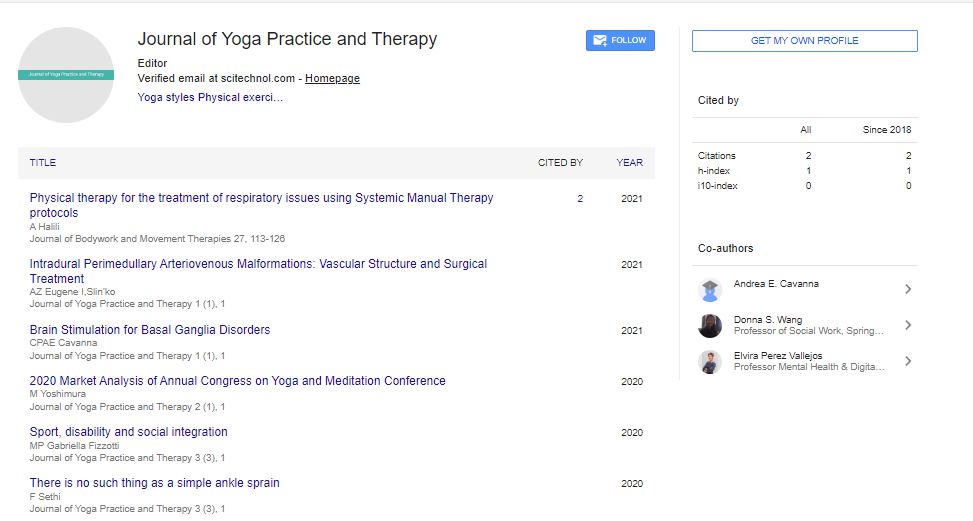Commentary, J Yoga Pract Ther Vol: 5 Issue: 3
20-minute Yoga Programme for Preventing Burnout in Healthcare Workers
Apar Saxena*
Department of Cardiology, All India Institute of Medical Sciences, New Delhi, India
*Corresponding Author: Apar Saxena
Department of Cardiology, All India Institute of Medical Sciences, New Delhi, India
E-mail:AparSaxena@aiimsrishikesh.edu.in
Received date: 03 May, 2022, Manuscript No. JYPTY-22-64390;
Editor assigned date: 05 May, 2022, PreQC No. JYPTY-22-64390 (PQ);
Reviewed date: 17 May, 2022, QC No JYPTY-22-64390;
Revised date: 24 May, 2022, Manuscript No. JYPTY-22-64390 (R);
Published date: 31 May, 2022, DOI: 10.4172/jypty.100098
Citation: Saxena A (2022) 20-minute Yoga Programme for Preventing Burnout in Healthcare Workers. J Yoga Pract Ther 5:3.
Keywords: Yoga styles, Physical exercises, Meditation, Mindfulness
Description
The 20-min yoga module indicated that experts consider these practices to be essential for reducing collapse among the healthcare worker. The strength of the 20-min yoga module lies in its short duration and easy-to- learn practices. 20-min yoga module can be enforced in practice by the healthcare worker for reducing collapse following efficacy studies through farther clinical trials. Yoga practitioners were further examined based on the duration of practice as; long-term, mid-term and beginners. Multivariate analysis indicates that yoga practitioners had significantly lower depression, anxiety, and stress, and higher general wellbeing as well as higher peace of mind than the other two groups. The results further revealed that the yoga practitioners significantly differed in the perception of personal control, illness concern and emotional impact of COVID19. However, there was no significant difference found for the measure of resilience in this study. Yoga practitioners also significantly differed in the cognitive reappraisal strategy for regulating their emotions than the other two groups. Interestingly, it was found that beginners -those who had started practicing yoga only during the lockdown period reported no significant difference for general wellbeing and peace of mind when compared to the mid- term practitioner.
Therapeutic Yoga
Evidence supports that yoga was found as an effective self- management strategy to cope with stress, anxiety and depression, and maintain wellbeing during COVID19 lockdown this study aims to determine the impact of yoga as an adjunct to standard remedy versus standard remedy alone on the characteristic burden in cases with intermittent vasovagal blackout. There's a significant reduction in the quality of life of cases with intermittent VVS. Being operation curatives have been largely ineffective. Recent trials have demonstrated the efficacy of yoga in conditions with autonomic imbalance, suggesting its possible mileage in VVS. Yoga as spare remedy is superior to standard remedy alone in reducing the characteristic burden and perfecting in cases with intermittent VVS. A high frequency of collapse has been reported among healthcare worker. During the current epidemic, similar collapse has increased due to inordinate cargo of patient care, use of particular defensive outfit accoutrements, working in long shifts, staying down from family due to insulation morals, and disintegrated social life. Being yoga ways used for reducing collapse include 45 min to hour-long sessions, which may not be doable for regular practice by the healthcare worker. The proposed study aimed to develop a 20-min yoga module to reduce collapse among healthcare worker. The content validity indicator of the entire module.
Habitual Venous Insufficiency
Habitual Venous Insufficiency (CVI) is frequently associated with prolonged standing at work. CVI could lead to multiple symptoms and vascular inflammation. Yoga as remedy has helped in mollifying several occupational hazards. The current study protocol is designed to assess the effect of Yoga on CVI. Data will be tested for normalcy and applicable tests Ankylosing spondylitis is a habitual seditious complaint that causes significant disability and reduced quality of life. Scientific studies on yoga have revealed its colorful health benefits in habitual conditions, including autoimmune conditions. Still, whether yoga is doable for AS cases or not isn't studied. Further, no validated yoga module is available for AS cases. The present study offers a validated yoga module conforming of 31 practices for AS cases. The results of the airman suggested that the module is doable, respectable, and easy to exercise for AS cases. We recommend that AS cases should exercise this yoga module for a minimum of 30 min every day under the supervision of a yoga expert. Yoga has several mechanisms that make it a promising treatment for depression and anxiety, including physical exertion, behavioral activation, and awareness. Following positive issues from acclimated CBT interventions incorporating awareness- grounded practices, this study explored the goods of a remedial yoga program as an adjunct to group- grounded CBT for depression or anxiety. CBT Yoga was a respectable volition to CBT alone. Significant reductions were observed in total DASS scores and the 3 subscales of the DASS for both groups, still CBT Yoga showed significantly lower depressive and anxiety symptomspost-intervention, compared to CBT alone. CBT Yoga also showed sustained reductions in depressive symptoms over three-months, and more rapid-fire reductions in depressive symptoms, compared to CBT alone.
 Spanish
Spanish  Chinese
Chinese  Russian
Russian  German
German  French
French  Japanese
Japanese  Portuguese
Portuguese  Hindi
Hindi 